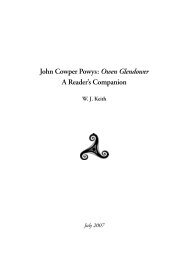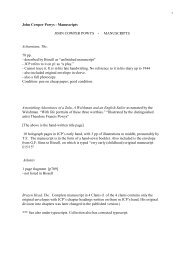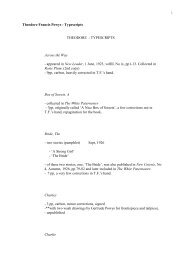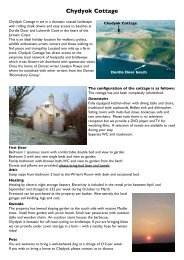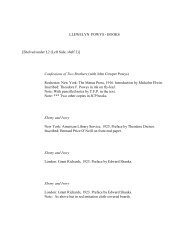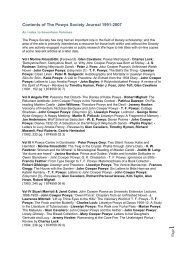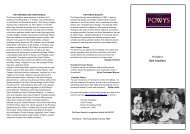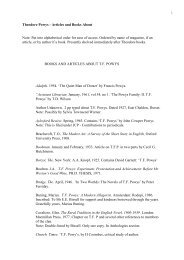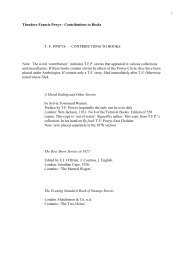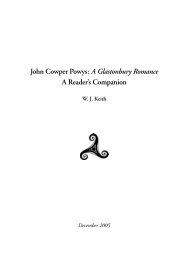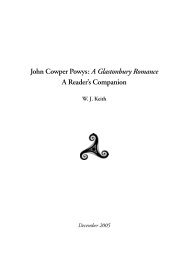J. C. Powys' Autobiography: A Reader's Companion - Site POWYS
J. C. Powys' Autobiography: A Reader's Companion - Site POWYS
J. C. Powys' Autobiography: A Reader's Companion - Site POWYS
You also want an ePaper? Increase the reach of your titles
YUMPU automatically turns print PDFs into web optimized ePapers that Google loves.
4 <strong>Autobiography</strong><br />
A<br />
“a deep and liquid rest, forgetful of all ill” (372) —<br />
From Shelley’s “Adonais” (l.63), also quoted in<br />
Rodmoor (456), A Glastonbury Romance (300), In<br />
Defence of Sensuality (159), Mortal Strife (58),<br />
Elusive America (43, 141), and Diary 1929 (117).<br />
“A fine, clean, upstanding youth” (516) —<br />
Perhaps a parody of A.E. Housman (“What, still<br />
alone at twenty-two / A clean, upstanding chap<br />
like you?”), written by Hugh Kingsmill<br />
(1889–1949).<br />
“a glimmering square” (369) — ”The casement<br />
slowly grows a glimmering square” from<br />
Tennyson’s lyric “Tears, Idle Tears” (l.14),<br />
originally a song from The Princess (IV, l.34).<br />
“a good man and one who did good things”<br />
(648) — Inaccurate version of the final line of<br />
Thomas Hardy’s The Woodlanders, spoken by<br />
Marty (sic) South.<br />
“a great mystery” (39) — Possibly an echo of<br />
Ephesians 5:32.<br />
à outrance (175) — Translated (from the French)<br />
in the text.<br />
“A parrot to an eagle came ...” (313) — From “The<br />
Parrot and the Eagle” (Poems [55]).<br />
“a savour of poisonous brass and metal sick” (470;<br />
cf. 380) — From Keats’s Hyperion (I 189), also<br />
quoted in After My Fashion (178) and<br />
Psychoanalysis and Morality (15).<br />
... a story, that is to say, the struggle of a soul ...<br />
(46) — Jeremy Hooker (John Cowper Powys [6])<br />
notes that this is an accurate account of<br />
<strong>Autobiography</strong> itself.<br />
“a stream of tendency” (295) — See “stream of<br />
tendency.”<br />
“A woman’s face ... treasure” (347) — From<br />
Shakespeare’s Sonnet 20, ll.1–2, 13–14.<br />
Abraham (469) — The Hebrew patriarch who led<br />
his people out of Ur of the Chaldees to the “Holy<br />
Land.” See Genesis 12.<br />
abysm of time (291) — From Shakespeare’s The<br />
Tempest (I ii 50), also quoted in Morwyn (200),<br />
Suspended Judgments (56), The Complex Vision<br />
(38), In Defence of Sensuality (22, 59), The Art of<br />
Growing Old (109); cf. The Meaning of Culture<br />
(29), Obstinate Cymric (162).<br />
“accept” the cosmos (374) — One of Walt<br />
Whitman’s basic attitudes; see Song of Myself 23<br />
(l.7). Also alluded to in In Defence of Sensuality<br />
(126).<br />
Achilles (106) — The leading Greek warrior in<br />
Homer’s Iliad, known for his speed and energy<br />
on the battlefield. See also “Podas okus” and<br />
“Zanthus and Balius.” So, “Achillean” (153).<br />
“acquiring merit” (431) — A standard religious<br />
term. Pilgrims acquire merit by going on<br />
pilgrimages. In the East, people still acquire merit<br />
by giving alms to priests.<br />
Acreman House (98) — The “new” residence for<br />
Sherborne Preparatory School in 1885, still in use,<br />
west of the town centre.<br />
ad infinitum and ad nauseam (443) — “Endlessly”<br />
and “to a disgusting extent” (Latin).<br />
Addisonian Spectators (118) — The famous<br />
periodical, The Spectator, first appeared in 1711. It<br />
was written primarily by Joseph Addison<br />
(1672–1719) and Richard Steele (1672–1729) and<br />
was most famous, perhaps, for the character of<br />
Sir Roger de Coverley. See “Spectator” for<br />
subsequent references.<br />
Aegripan (261) — Presumably indicating a Bacchic<br />
follower, the word does not occur in the standard<br />
English or Classical dictionaries.<br />
Aeschylus (9) — Greek tragic dramatist of the<br />
sixth century BC, best known for his surviving<br />
trilogy, the Oresteia.<br />
African negroes (455) — This is an early<br />
manifestation of JCP’s belief, prominent in Porius<br />
and discussed in Obstinate Cymric (8–9), that the<br />
Welsh were non-Aryan descendants of<br />
inhabitants from Atlantis originating (like the<br />
Druids) in North Africa.<br />
“after the Great <strong>Companion</strong>s” (542) — From<br />
Whitman’s “Song of the Open Road” (12., l.1),<br />
also quoted in The Pleasures of Literature (441),<br />
where the phrase is interpreted as “the souls of<br />
all the dead.”<br />
Agag (401) — The King of the Amalekites spared<br />
by Saul but slain by Samuel; see 1 Samuel 15. For<br />
“deliberately,” see v.32, also quoted in Owen<br />
Glendower (327).<br />
Agape (339–40) — Christian love as discussed by<br />
St. Paul in 1 Corinthians 13 (“the famous list of<br />
attributes”). In the King James (Authorized)<br />
Version of the Bible (“our proper old version”) it<br />
is translated as “charity,” though later translations<br />
tend to substitute “love.” For JCP’s further<br />
discussions of agape, see The Pleasures of<br />
Literature (216, 219, 232–3), Dostoievsky (156–8),<br />
and Letters to Miller (39–40).<br />
Agawamuk (135) — A river close to JCP’s home,<br />
Phudd Bottom, in Hillsdale, New York State.<br />
“age cannot wither him nor custom stale”<br />
(261) — Adapted from Shakespeare’s Antony and<br />
Cleopatra (II ii 241), also quoted in the 1955<br />
introduction to A Glastonbury Romance. Cf.<br />
Wood and Stone (21).<br />
aged relative (18, 42) — JCP’s paternal<br />
grandmother, Amelia (Emily) Powys (1830–1902).<br />
The phrase is apparently used to avoid revealing<br />
her as a woman, following the original principle



